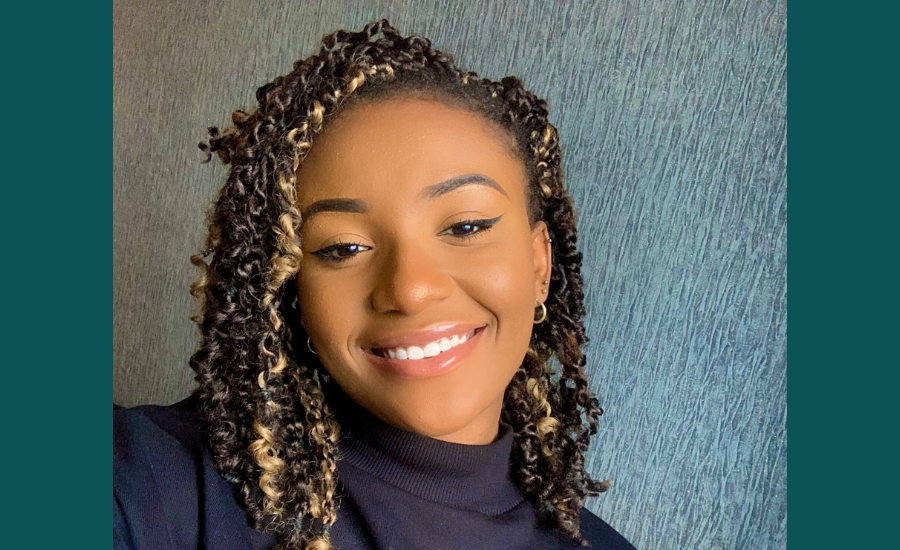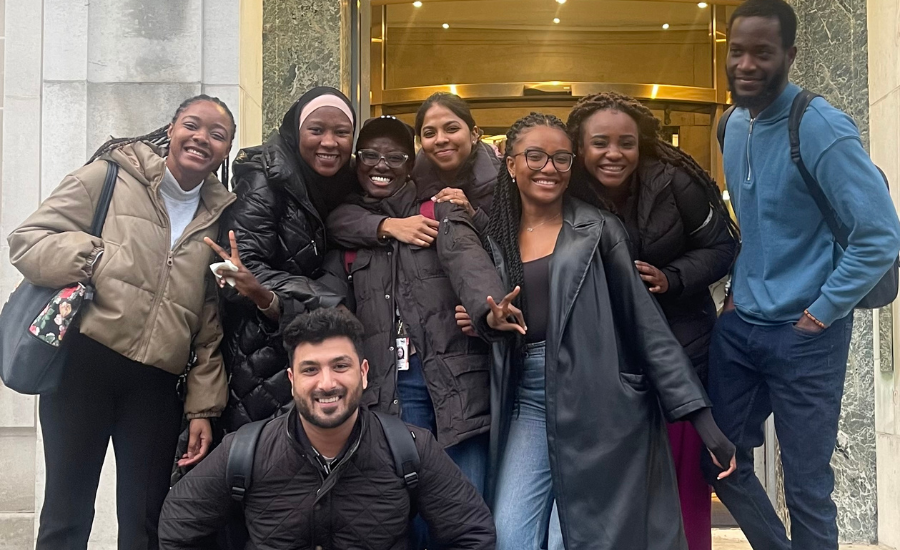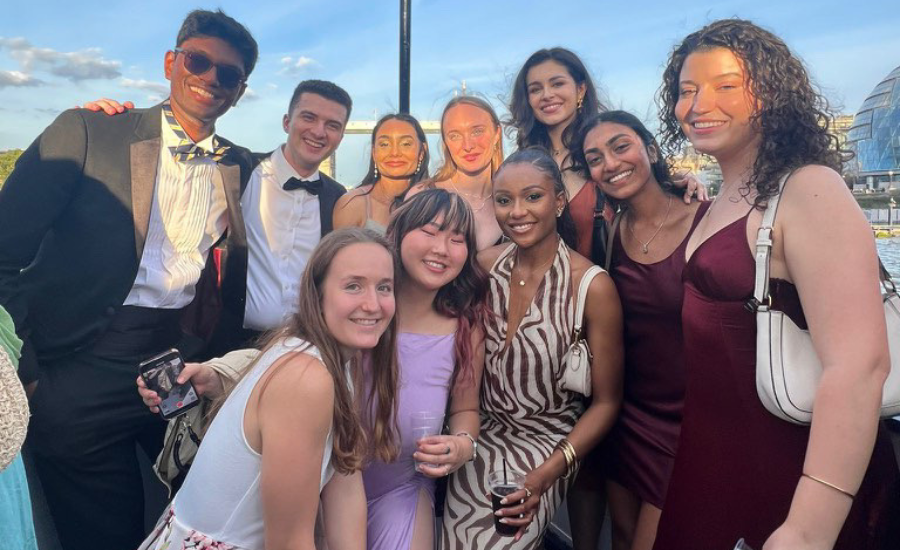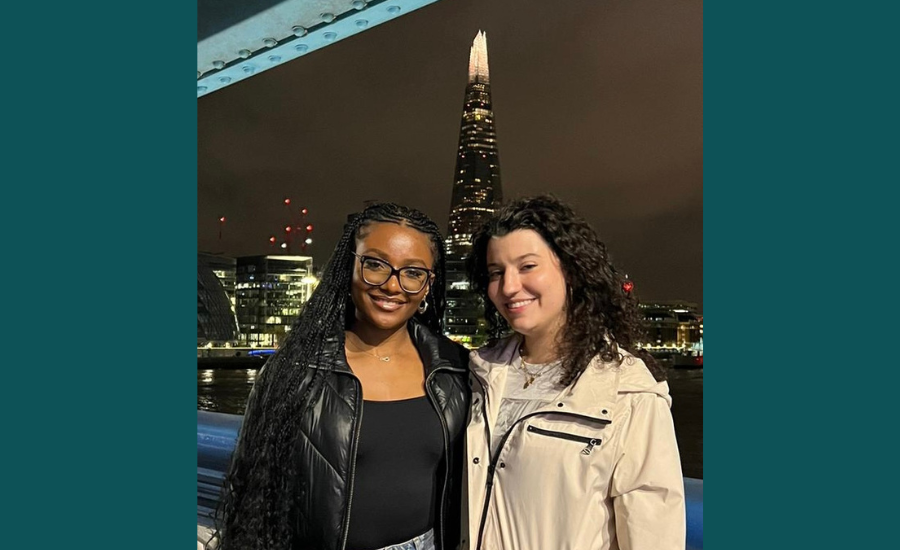Bridging gaps in public health: Victoria's Perspective
19 August 2024 London School of Hygiene & Tropical Medicine London School of Hygiene & Tropical Medicine https://lshtm.ac.uk/themes/custom/lshtm/images/lshtm-logo-black.png
Victoria Balogun
Where and what did you study before joining LSHTM?
I was a medical student at King’s College London. After completing my third year, I decided to pause my medical studies to pursue an intercalated MSc Public Health at LSHTM.
What barriers have you faced during your education?
Migrating to the UK as a child, substantial societal and language differences led to feeling overlooked and underestimated in class. However, my parents' unwavering support was a driving force that instilled in me self-motivation and resilience. They taught me not to dwell on one's weaknesses but to become a problem solver, always seeking solutions and opportunities for growth. To improve my language skills and boost my confidence, I actively engaged in activities such as reading literature, writing blogs, and participating in debates. Such dedication helped me achieve an A* (Grade 9) in GCSE English and academic accolades, such as ranking in the top 10% of my year group.
Despite growing up in a socio-economically deprived community, I was determined not to let my current circumstances dictate my future. From the age of 13, I proactively sought and shared various career opportunities with friends to enhance our future job prospects. Recognising the insufficient resources for medical school applications at my state school, I created a 'healthcare society': a space to pool resources and provide peer-to-peer support.
Financial constraints meant I had to use my initiative to maximise the resources available to me. I utilised public libraries, free online resources and worked as a tutor during my studies. During my A-levels, I applied for scholarships and was fortunate to receive the Southwark Scholarship, recognising my commitment to the community and academic excellence.
How have the barriers you’ve faced shaped your academic and personal development?
Navigating diverse academic environments, such as dealing with my initial societal differences, taught me the importance of adaptability, resourcefulness, and resilience. While state schools and teachers often fall short, they do their best within the limited resources available. Recognising this gap, I took it upon myself to take greater control over my future and ambitions, seeking additional external opportunities for support where possible.
Socio-economic challenges motivated me to actively seek and share career opportunities from a young age, exemplified by initiatives such as establishing a 'healthcare society’. This experience highlighted the transformative power of community support and reframed adversity as a shared opportunity for innovation. By working together, we can bridge gaps and create a stronger, more resilient community, demonstrating that solutions are often found through collaboration with those around you.
What advice would you give someone to help them overcome a similar challenge?
Embrace your story! Your background and challenges are your story; they shape the person you are today and the one you’re destined to become. Your distinct perspective brings value and resilience to the table. Let your journey empower you - never let it hold you back.
Seek support from family, friends, mentors, or even strangers. Sharing challenges opens doors to valuable insights and assistance. My mum always said, "A problem shared is a problem half solved," and I believe her! Seeking support is a courageous step toward overcoming obstacles.
Lastly, a valuable piece of advice I took from the remarkable girls’ education activist Dr Vee Kativhu is to celebrate every milestone—no matter how small. Whether you choose to celebrate publicly or privately is up to you! But recognise that overcoming challenges is a journey, and each step forward is a victory worth marking. Celebrating progress boosts your morale, reminds you of how far you’ve come, and provides the perseverance to keep going.
As a scholarship recipient, how would you describe the impact this has had on you?
Having a position at this renowned institution with a scholarship surpassed my wildest expectations. It feels like a pinch-me moment — I am genuinely beyond grateful and honestly still can’t believe I am here. Perhaps it will finally kick in on graduation day!
The Next Generation scholarship has been transformative, enabling me to pursue an MSc that was financially out of reach. It has provided me with the freedom to focus on my studies and extracurricular activities without constant financial concerns.
Over the past years, I have developed my passion and experience in public health. This MSc programme has equipped me with the knowledge and skills needed for the field. It has shown me that while passion gets you started, the knowledge you gain is what truly enables you to thrive. Now I feel unstoppable and am excited about what life after this MSc holds!
Importantly, it instilled hope and courage, reminding me that statistics and current circumstances do not dictate one’s capabilities. It’s a testament to the belief that someone will recognise your potential and you will provide an opportunity, as LSHTM has done for me.
Many of our scholarships are kindly funded through philanthropy – what message would you like to share with someone considering contributing to our scholarship programme?
By supporting scholarships, you are not just funding education, but you are building a community of diverse talents, perspectives, and ambitions. For those without the resources to follow their academic goals, your contribution can open doors to education and generate opportunities. It’s an investment in their potential, resilience, and the future leaders of our society.
Your philanthropy becomes a beacon of hope for those who, like me, have dreams that surpass financial limitations. It sends a powerful message that everyone has the right to good quality education and should be able to succeed, regardless of their background.
How are you finding your programme so far?
My programme experience has been incredible, offering rich opportunities for knowledge and diverse connections with like-minded people dedicated to revolutionising health. Despite the intense workload, it has pushed me to acquire new skills and broaden my perspective on public health.
I am working on my dissertation, which is a qualitative study on ‘Regulating AI Interactions in Early Childhood’. I love how this project has allowed me to embrace a new perspective integrating public health, policy, and technology. Along the way, I’ve also had the opportunity to learn and apply new research methodologies and practices!
The programme’s intensity and richness make every effort worthwhile - I am loving its positive impact on my personal and professional growth.
What are your plans for after your MSc degree?
Firstly, I plan to complete my remaining two years at medical school, integrating the comprehensive knowledge acquired during my MSc to enhance my medical practice. While in medical school, I am eager to engage in projects focused on improving social and systemic issues that affect people’s access to quality education and healthcare.
On a community level, I lead a health education project called ‘Nurtured,’ which focuses on empowering Black community members with health confidence, promoting well-being, and addressing systemic disparities. I aim to apply the principles from my selected MSc modules to enhance and scale the project’s impact.
Having lived in London for over 20 years since migrating from Nigeria, I recognised my positionality as having a Westernised view of health, the health system, and practices. Coming into this MSc program, I was determined to challenge and broaden my perspective by gaining new knowledge on practices relevant to Nigeria and other low- and middle-income countries. I set myself the challenge of focusing every module single assignment on these contexts, and I am pleased to say that I have completed this goal and learned a great deal! I am committed to building on this knowledge after completing the MSc and am dedicated to making a positive impact in Africa by combining my diasporic perspective with my Nigerian background to advance health and advocate for equitable healthcare policies and practices.
What advice would you give to someone considering applying for your programme and/or the Next Generation scholarship at LSHTM?
Three words… go for it!
- Contact Victoria via our contact student ambassador page.
- Check our master's funding and scholarships page. This page is updated regularly as new opportunities open. Many scholarships open between November and April. Students are also recommended to search for alternative sources of funding.
- Understand more about access and widening participation at LSHTM.
- Discover MSc Public Health.


